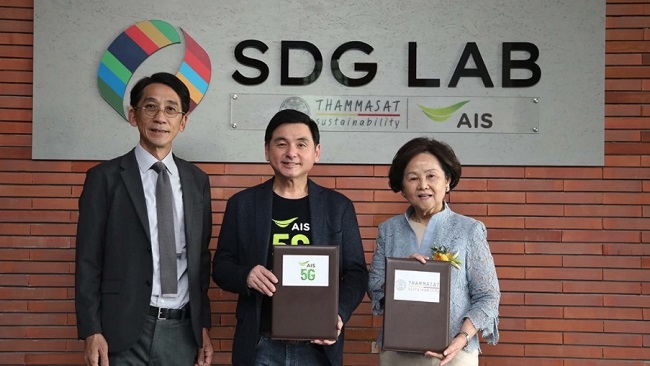SDG Lab by Thammasat & AIS – the first lab for sustainable development in Asia
Thammasat University and AIS use technology and digital service to drive Thailand closer to SDGs, developing the country’s economy, society, as well as solving environmental problem.
Tuesday 15 June 2021

Thammasat University (TU) and Advanced Info Services (AIS) use technology and digital service to drive Thailand closer to the United Nations Sustainable Development Goals (SDGs), developing the country's economy, society, as well as solving today's environmental problem.
TU together with AIS open the first lab for sustainable development in Asia "SDG Lab by Thammasat & AIS" at 100 years Puey Park, Thammasat University, Rangsit Campus. The SDG lab is design and built under the concept of using 5G and IoT technology as a foundation for sustainable development, acting as the hub of experiments for innovators and inventors. The ultimate goal is to improve people's quality of life while using resources efficiently and effectively without exceeding the amount that nature can potentially offer.
SDG Lab by Thammasat & AIS is set to be a symbol of taking actions toward the SDGs, creating innovation and positive impacts on the society, and a practical space people can use to work on their projects. Therefore, the design has a very significant role in delivering those purposes. For example, the building is built with open ceiling. There is also a slider connecting between the 1st and 2nd floor which symbolize the flow of innovative ideas. The furnitures are made from recycled natural materials like hay, wood, dead rubber, and carton. There is also an open space area filled with many small zones such as Demonstration Space, Makerspaces, Co-Working Space, Event Space and Meeting room, equipped with network infrastructure and equipment like 3D printing machine.
The five main purposes of the SDG Lab by Thammasat & AIS are:
1. Climate& Environment: using 5G technology in solving climate change and air pollution problems.
2. City: using 5G technology to develop transportation systems within the university such as self-driving cars, at the same time, connect them to the security system in the area.
3. Living: improving our quality of life with recycled material by using technology to manage natural resources and electronics waste.
4. Farming: developing technology for sustainable farming that helps ensuring the sustainability of food supply with 5G and IoT technology, creating a sustainable change and potentially reducing energy used up to around 30%.
5. People: developing knowledge, creating inspiration, and promoting participation among the university network for sustainable development.
SDG Lab by Thammasat & AIS, therefore, will be a prototype project for future innovation hub that will take our country to the next level sustainably. It also allows students next generation of innovators, and start-up to create sustainable innovation that will benefit the country and the people. This is resonating with the university's goal of creating smart city.